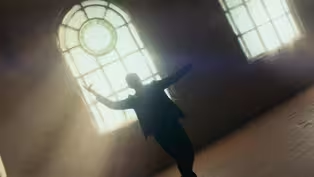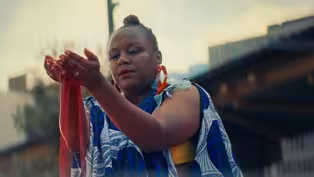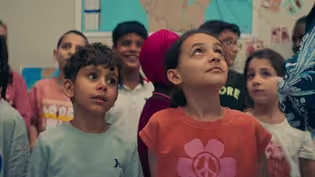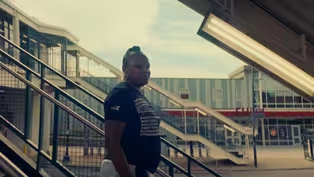
Dulé Reads for the Andre Theatre Collective Casting Session
Clip: Episode 4 | 8m 14sVideo has Closed Captions
Dulé Hill joins the Andre Theatre Collective for their first casting session.
Dulé Hill joins a casting session with the Andre Theatre Collective, a group trying to produce their first play, which was written by incarcerated playwrights. The play examines why much of the city has been marred by crime, especially for those living in Black communities.
Problems playing video? | Closed Captioning Feedback
Problems playing video? | Closed Captioning Feedback
This program was made possible by a grant from Anne Ray Foundation.

Dulé Reads for the Andre Theatre Collective Casting Session
Clip: Episode 4 | 8m 14sVideo has Closed Captions
Dulé Hill joins a casting session with the Andre Theatre Collective, a group trying to produce their first play, which was written by incarcerated playwrights. The play examines why much of the city has been marred by crime, especially for those living in Black communities.
Problems playing video? | Closed Captioning Feedback
How to Watch The Express Way with Dulé Hill
The Express Way with Dulé Hill is available to stream on pbs.org and the free PBS App, available on iPhone, Apple TV, Android TV, Android smartphones, Amazon Fire TV, Amazon Fire Tablet, Roku, Samsung Smart TV, and Vizio.
Buy Now
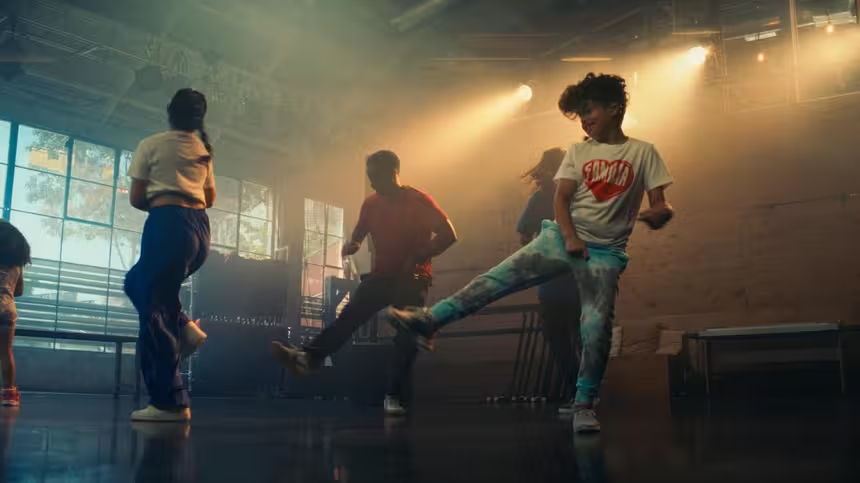
5 Artists Showcasing the Power of Art
From colorful cabarets and moving movies to artistic techniques that transcend the senses, here are five inspiring artists highlighted in The Express Way with Dulé Hill.Providing Support for PBS.org
Learn Moreabout PBS online sponsorship♪ It is crazy being back in this joint, though.
Muir: Yeah.
I remember the first time I seen you was just in the hallway.
You had on that Nike hoodie from Urban Outfitters, and I remember I wanted to steal it so bad.
We stole that Nike hoodie.
[Laughter] Muir: So I met Joey his freshman year, and then Kemdah I met through social work.
Yeah, yeah, yeah.
Way I met James was through y'all... Purp: Mm-hmm.
so all of us knew each other in high school.
Muir: What was really beautiful about it is, we all kicked it with each other.
We all knew each other.
I went to this community school called Whitney Young.
James went to King.
Joey went to Whitney.
We all partied with each other.
We all, like, loved each other.
At the same time, we all had to go home, and we all had to go back to the 'hood.
Purp: Downstairs in the arts building, it was a full recording studio, fully furnished with a board, mixer, everything.
The first time I ever been in a studio and watched somebody record music Was down there.
was in there.
I didn't start rapping for real till after high school, but Vic, for the most part, was the one rapping, and Chance was rapping, too, but he went to Jones, so he was over there doing the same thing.
I always respected how creative they were.
Vic Mensa, he started this band called Kids These Days, and I produced this music video for them.
Mensa: ♪ Oh, I remember when we first met ♪ ♪ In sixth grade when you hadn't been hurt yet... ♪ Muir: That was my first foray into visual arts, and they kind of all formed this collective called Savemoney.
Mensa: ♪ Don't be a young perp ♪ ♪ Mission since birth to fiscally thirst ♪ ♪ In good times, we wait for the worst ♪ [Gunshot] Muir: For James to have been in this collective, it means that he made a decision to try and separate himself from the things that were going on in his neighborhood, and so, for him to be sitting in jail right now, it's circumstance.
Especially as a Black man, you're one bad mood, decision, miscommunication away from sitting in jail.
♪ Purp: When's the last time you talked to him?
Muir: I just talked to James yesterday.
I just gave him a few updates on, like, what's going on with the play, and it's tough.
You have 15 minutes, and it's like you try to pack in as much information as you possibly can.
That's what we're doing.
We're, like, we're sitting here waiting.
[Cell phone rings] OK. All right.
Yo.
I'm good.
I'm good.
I'm good.
The casting is happening on Saturday.
As we're going through the auditions, is there any, like, thing about any character that stands out that you really want to kind of come through?
Mm-hmm.
♪ Muir: This is the first time, like, we're gonna sit and watch people bring this to life.
James, when we talk about it, that's the thing that he gets the most excited about because he was like, "This is real."
♪ Muir: What's your name?
I'm sorry.
Steven Long.
Steven Long, thank you so much for coming out.
Dude, I know this cat.
How you doing, man?
I'm your reader, man.
I'm your reader.
We about to do a scene together.
Yeah.
Muir: You'll be Lenny.
You're Amiri.
OK. You just met a young man named Dante.
You saw him, and it's like there's nothing there in his eyes OK.
Anytime?
Anytime, whenever you're ready.
Zach, are we recording?
We're recording.
Perfect.
Hey, hey, you got your feet on it.
Hill: Oh, my fault.
"The Story of Violence"?
Yeah--fear, flight, fate.
That's what I saw in his eyes, Lenny, you know, but it's not just him.
It's--it's their entire generation.
Come on, man.
Now you're being dramatic.
You can't paint an entire generation with the same brush.
No, but the youth is the future, and death and destruction has, uhh-- it's become their norm.
It's diminished their resolve.
It's--it's intertwined with their being.
Don't say that.
Don't say that, Amir.
The youth are resilient and adaptive, and in due time, they'll realize their potential.
Just trust the process.
♪ Muir: So I lived as far north in Chicago as you possibly can.
They call it, like, the North Pole.
In Chicago, the North Side is, like, the well-to-do people, and then the South Side is, like, kind of lower-income... but I live in this one little pocket in Rogers Park where things are actually pretty dangerous.
When I was young, I saw a young woman get shot, and it actually is, like, what kind of was the impetus for my short film "4 Corners."
[Two gunshots] [People shouting] Muir: As I left the corner store, I heard, like, this pop-pop-pop... Man: Call 911!
Muir: but I didn't know what that was...
I got you.
Someone call for help.
Muir: and so then I, like, kept walking, and then when I got over here, it was, like, this lady that got shot.
I just remember her gripping her leg, and it, like, stood out to me as, like, a young boy.
Man: Stay focused.
You're gonna be all right.
[Siren] Muir: I was like, "Damn, why did she get shot right here?"
"Oh, because we just shot somebody, like, a week ago"... and then I was like, "Oh, well, why we shoot this person a week ago?"
[4 gunshots] Muir: "Because they shot our homie two weeks ago."
That's how it works in Chicago.
It's this tit for tat.
"You killed my homie, I'm gonna kill you," and it's gonna keep going back and forth forever because no one knows why it started.
♪ I have empathy for James.
His homies are dying.
His cousin had just got killed.
That was a lot for him.
Either you cut your emotions off when you get through that or you dive into them, and it messes you up.
James, he's--like, remind me a lot of my brother.
My brother was very sensitive and very kind.
Life is hard for people that are kind.
I grew up in this home, like, through my high-school years, especially the years that I, like, met Joey and met Kemdah and met James, but this is my first time in this house in 3 years.
Yeah.
I mean, it definitely brings up memories, being back.
We grew up on this street, Greenleaf, and we were really close with the young men from Howard Street.
Those were our best friends; we played football together, basketball together, on the same teams, all of that.
But one day, a war broke out.
All of a sudden, your best friend from when you were 9, 10, 11 is now your enemy.
People started dying.
Now there's no room for forgiveness.
Yeah, and then my brother, they wanted to kill him, and I think that got to him, and so, you know, he'd stay home and he would drink.
My brother, he died upstairs.
He drank himself to death.
♪ He died when he was 27, I was 26.
You always think you have more time, but you don't.
That's another reason why I like the story, that James and I agreed to do it.
It's just, like, it's 5 men trying to figure out why it is the way that it is, and they don't come to a conclusion.
Bassel & The Supernaturals Perform “Black Water”
Video has Closed Captions
Clip: Ep4 | 2m 38s | Bassel Almadani and his band, Bassel & The Supernaturals, perform the song “Black Water.” (2m 38s)
Video has Closed Captions
Preview: Ep4 | 30s | In Chicago, Dulé Hill explores why art and activism are synonymous. (30s)
Dulé Meets Refugee Children at the Syrian Community Network
Video has Closed Captions
Clip: Ep4 | 3m 57s | Dulé Hill meets refugee children with Bassel Almadani at the Syrian Community Network. (3m 57s)
Vershawn Sanders Ward Teaches Afro-Contemporary Dance
Video has Closed Captions
Clip: Ep4 | 2m 24s | Dulé Hill learns Afro-Contemporary dance with Vershawn Sanders Ward. (2m 24s)
Providing Support for PBS.org
Learn Moreabout PBS online sponsorshipSupport for PBS provided by:
This program was made possible by a grant from Anne Ray Foundation.
